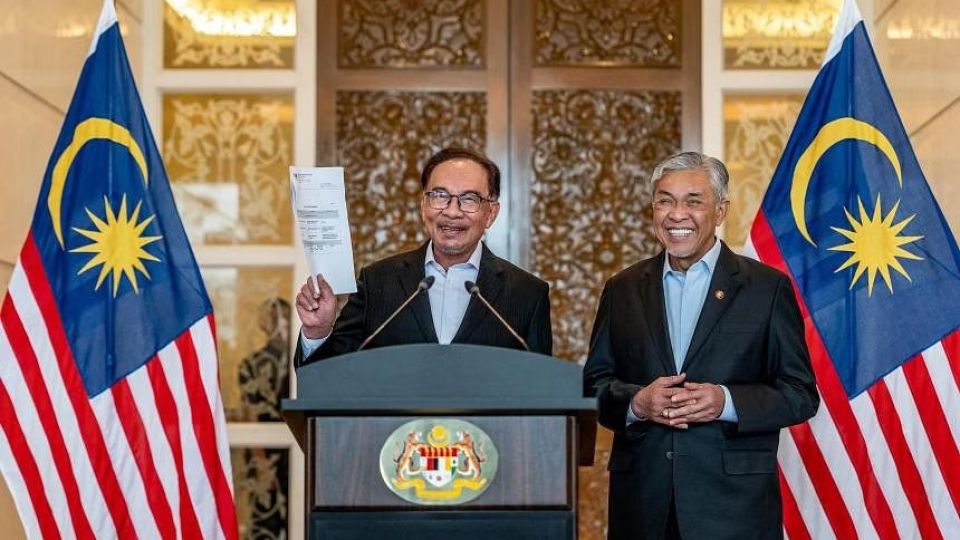December 13, 2023
KUALA LUMPUR – Malaysia announced a major Cabinet reshuffle on Dec 12, with new ministers being appointed to key portfolios, including finance, foreign affairs and health.
The move comes one year into Prime Minister Anwar Ibrahim’s administration, which faces slowing economic growth and criticism that promised reforms are not being implemented fast enough.
Among the key changes is the appointment of Datuk Seri Amir Hamzah Azizan as finance minister II. Mr Amir Hamzah is the former chief executive of the Employees Provident Fund (EPF), the national pension fund.
He will now assist Datuk Seri Anwar, who is also finance minister.
Speaking to the media after the announcement, Mr Anwar said that a second finance minister was required to address the country’s economic issues.
“My personal view… is that the Ministry of Finance must have a strong and professional team to ensure that we are on the right track and focus on the economy.
“And he (Mr Amir Hamzah) has shown enough competence, ability, and has managed the EPF in a very impressive and satisfactory manner,” he said.
Meanwhile, Dr Dzulkefly Ahmad returns to helm the Health Ministry, taking over from Dr Zaliha Mustafa. An MP from Parti Amanah Negara, Dr Dzul, as he is popularly known, served as health minister from May 2018 to February 2020, during the Covid-19 pandemic. Dr Zaliha has been appointed the new federal territories minister.
Human Resources Minister V. Sivakumar has been replaced by Mr Steven Sim Chee Keong, who had assisted Mr Anwar as deputy finance minister II prior to his new appointment.
There had been multiple calls for Mr Sivakumar to step down after several officers in his ministry were embroiled in corruption claims.
Some ministers remain in the Cabinet but have switched portfolios.
Defence Minister Mohamad Hasan will take over the foreign minister’s post from Datuk Seri Zambry Abdul Kadir, who will, in turn, helm the Higher Education Ministry, previously headed by Datuk Seri Mohamed Khaled Nordin.
Mr Mohamed Khaled will take over as defence minister.
Datuk Armizan Mohd Ali, who was a minister in the Prime Minister’s Department, has been given the task of leading the Domestic Trade and Cost of Living Ministry.
The post had been vacant since July, after the death of Datuk Seri Salahuddin Ayub.
Two new ministries have been created from existing portfolios covering the environment and communications.
Deputy Prime Minister Fadillah Yusof will head the new Energy Transition and Public Utilities Ministry, which was previously part of the Natural Resources, Environment and Climate Change Ministry led by Mr Nik Nazmi Nik Ahmad.
Mr Nik Nazmi is now minister for natural resources and sustainability.
A new Digital Ministry will be helmed by Puchong MP Gobind Singh Deo.
This portfolio was previously placed under the Communications and Digital Ministry led by Mr Fahmi Fadzil, who will now head the Communications Ministry.
Datuk Seri Johari Abdul Ghani will be the new plantation and commodities minister, taking over from Datuk Seri Fadillah.
Analysts said the appointments reflected Mr Anwar’s delicate balancing act – to ensure representation from parties in his Pakatan Harapan (PH) coalition and government ally Umno on the one hand, and to gain public favour on the other.
“Reappointing Dr Dzulkefly to the Cabinet is an attempt at winning public support and at the same time maintaining Amanah’s quota in the Cabinet,” said Mr Adib Zalkapli, director at advisory firm BowerGroupAsia, referring to Parti Amanah Negara, which is part of PH.
The returning Health Minister has been viewed favourably by the public for being decisive during the initial stages of the pandemic, Mr Adib told The Straits Times.
The Prime Minister’s pragmatism also shone through in the selection of non-politician Amir Hamzah as finance minister II to help boost the economy, said Professor Kartini Aboo Talib from Universiti Kebangsaan Malaysia’s Institute of Ethnic Studies.
Another contender for the post before the reshuffle was Mr Johari, the new plantation and commodities minister and a vice-president of Umno who had served as second finance minister under former prime minister Najib Razak.
“Although Johari Ghani is assumed to be more experienced, Mr Anwar must balance political necessity against his popularity as PM,” said Prof Kartini.
Meanwhile, shifting Umno’s deputy president Mohamad, popularly known as Mat Hasan, to the less-powerful foreign ministry is seen as a concession to Umno president and deputy prime minister Zahid Hamidi, said Dr Oh Ei Sun, a senior fellow at the Singapore Institute of International Affairs.
“The previous position was too powerful for Zahid Hamidi’s comfort,” said Dr Oh.

